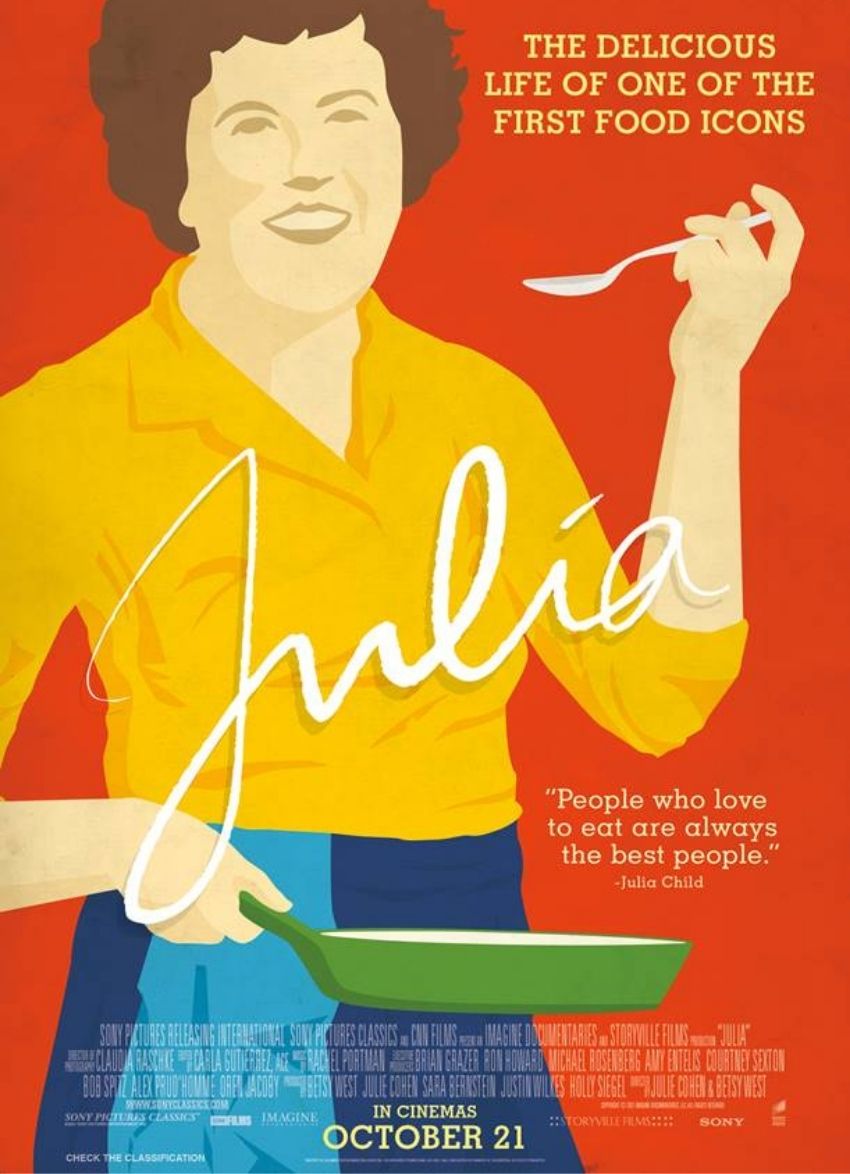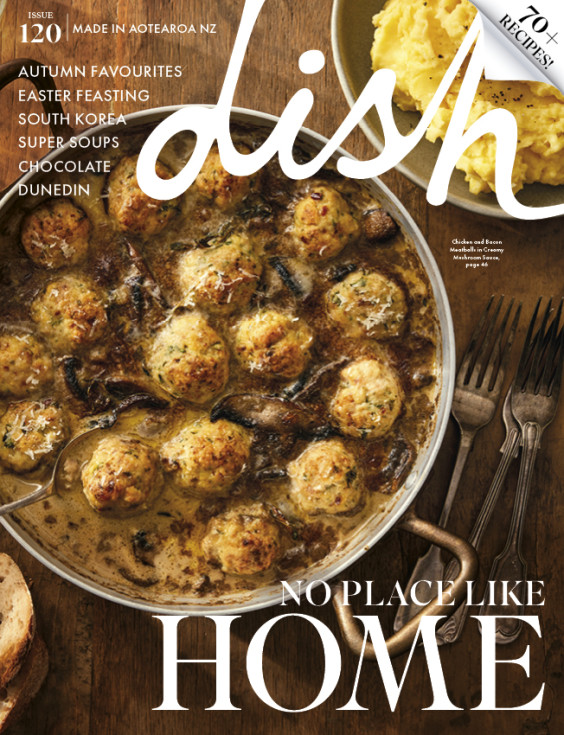Feast your eyes

Introducing Julia, a charming new documentary about the life of Julia Child, from the makers of RBG.
Food lovers, we’ve got a treat for you: Julia, a new documentary about the life of American culinary star Julia Child, is released on 21 October. Drawing on rare archival footage and Julia’s letters, as well as interviews with those who loved her, the film brings to life each stage of Julia’s life – from her years in Paris, falling in love with French cuisine, to her period in Cambridge, Massachusetts, bringing French food alive on television for American audiences. We have 10 double passes to give away – just enter your details in the form below to go in the draw to win!
Below, Maddie Ballard catches up with directors Julie Cohen and Betsy West to hear about their inspiration for making the film.
What made you want to make this documentary? Why did you choose Julia Child as a subject?
Julie: When we finished our documentary about the US Supreme Court Justice, Ruth Bader Ginsburg (RBG, 2018), there was a lot of enthusiasm for that story, not just because of RBG herself, but the whole idea of telling atypical women’s stories in a way they’re not always necessarily told. A lot of people came to us with potential stories about different women for our next film and we considered a wide array – but ultimately we decided that Julia Child’s story had so much to it.
Betsy: Julie and I had a fantastic cross-town bus-trip in which we were reciting all the ridiculous dishes we ate as children – you know, the mushroom soup tuna fish salad and the hotdog creole and the various jello concoctions – and it just made us think about how much Julia changed the way Americans eat and think about food. As we got more into it, we also realised that Julia changed who was acceptable to be on television. Before Julia, you just didn’t have middle-aged women who were teaching you something on TV. So it just seemed that her story would be both fun and revelatory to tell.
Julia is full of interviews with some fascinating figures. Who were some of your favourite interviewees?
Julie: We particularly loved two women in their eighties from the professional food world, one in England, one in France: Ann Willan and Danièle Delpeuch. Both of them were very close friends of Julia and shared her no pulled punches attitude. We loved hearing both of them describe the atmosphere of the times they lived in. Like, we loved Danièle, someone who went on to become the personal chef of François Mitterand, telling us that when she was learning to cook, she was told that women don’t belong in the kitchen because the pots and pans will be “too ‘eavy for ’er”!
Betsy: And in general we had so much fun filming in France and talking to French people about Julia. We loved François Simon, the anonymous food critic, who talked in a very evocative way about the sexuality of food and how French people think about eating… that was really fun. The whole French shoot in October [2019] was just super fun – just to go to Julia’s haunts, visit La Couronne [the first restaurant Julia ate French food at] and to see the sole meunière [the dish that made her fall in love with French food] be prepared and hang out in Paris a little bit. Of course, it became kind of a dream when we were all locked up a few months later because of the pandemic. We just kept thinking, oh my God, how lucky we were that we did all that filming earlier, so we were able to edit from home, but also just what a wonderful experience that was, to see France through Julia’s eyes.
What do you love about Julia Child?
Betsy: We are both cooks, although we don’t necessarily cook from Julia Child’s cookbook every night because sometimes that requires a little more preparation than we’re putting in! But we definitely felt the impact of Julia’s cooking and were inspired during the pandemic to try a few Julia recipes. We discovered recently that we’re both cooking Salade Niçoise about once every couple of weeks. But I also really appreciated Julia’s forging ahead in middle age, in the face of a lot of discouragement except for from her husband, to find a purpose in life. I just found that super moving and the fact that she pulled it off is inspiring.
Julie: I love everything having to do with the food – watching Julia prepare it as we got to do on those old clips of [Julia’s American television show] The French Chef, is just really fun but they also teach you what to do. And then having the opportunity to recreate all the food as part of our final stage of production – that was great. We did a shoot where we hired a professional food stylist and cook to prepare some of Julia’s recipes on camera. You see her hands and her torso in the film, playing Julia Child, and every recipe featured in the film is an actual, authentically prepared Julia recipe.
I love all the archival footage in the film – the clips from The French Chef and also just from Julia’s life. How did you choose those clips?
Betsy: We had an archival producer and we asked them to look through the material and methodically categorise it. They went through and said, here are examples of Julia making a mistake and recovering from it, here are jokes, here are just funny flamboyant moments, and we had a chart for reference when putting the film together.
Other than footage of The French Chef, one of the coolest and most unexpected things we came across was the Julia Child Archive which is at Harvard University and contains Julia and Paul’s letters to and about each other, and also Paul’s amazing photography. To us, those shots he took of Julia in France after World War Two are just so beautiful and evocative and you can just tell how much he loved his wife. That also became a very rich part of the story.
Was there anything you learned during production that surprised you? I was fascinated to learn that Julia had spoken out for Planned Parenthood, for example.
Julie: Yes, we loved learning about that too. But our biggest “surprises” as such were when we found things in the archive that we were looking for but just hadn’t been sure we’d be able to find. For example, we knew Julia spoke out for Planned Parenthood later in her career but we weren’t sure we’d be able to find any footage to support that. But then we found some footage from Tennessee of people protesting Julia when she’d spoken out. Also, our archival producer went to a lot of trouble looking for and ultimately found an amazing clip from 1988 of Julia doing an AIDS benefit. That was a pretty amazing find.
What are your favourite Julia Child recipes?
Julie: Ooh… aside from the Salade Niçoise, I’ll spotlight the very simple roast beef and potatoes recipe that Ann Willan describes in pretty good detail in the film how to make it. It’s delicious – particularly those potatoes. That’s now a go-to way that I prepare potatoes. It had never occurred to me that you could just blanch your potatoes a little bit, score them and then roast them… and they’re really crispy just like Ann describes in the film.
Betsy: I’ve tried that as well – it’s great! I’d also say Julia’s roast chicken is a great stand-by. And I’m planning to make Julia’s pear tart, which Julie has tried too, with success.
This interview has been lightly edited for length and clarity.
latest issue:
Issue #120
As the days become shorter, and the nights cooler, the latest issue is perfectly timed to deliver delicious autumn dishes. From recipes using fresh seasonal produce such as feijoas and apples, to spectacular soothing soups and super-quick after-work meals in our Food Fast section, we’ve got you covered. With Easter on the horizon, we feature recipes that will see you through breakfast, lunch and dinner over a leisurely weekend holiday, and whip up chocolatey baking treats sure to please. We round up delicious dinners for two and showcase a hot new Korean cookbook before heading south to Dunedin to check out all that’s new in food and dining.The latest issue of dish is on sale NOW at all good bookstores and supermarkets – don’t miss it!

